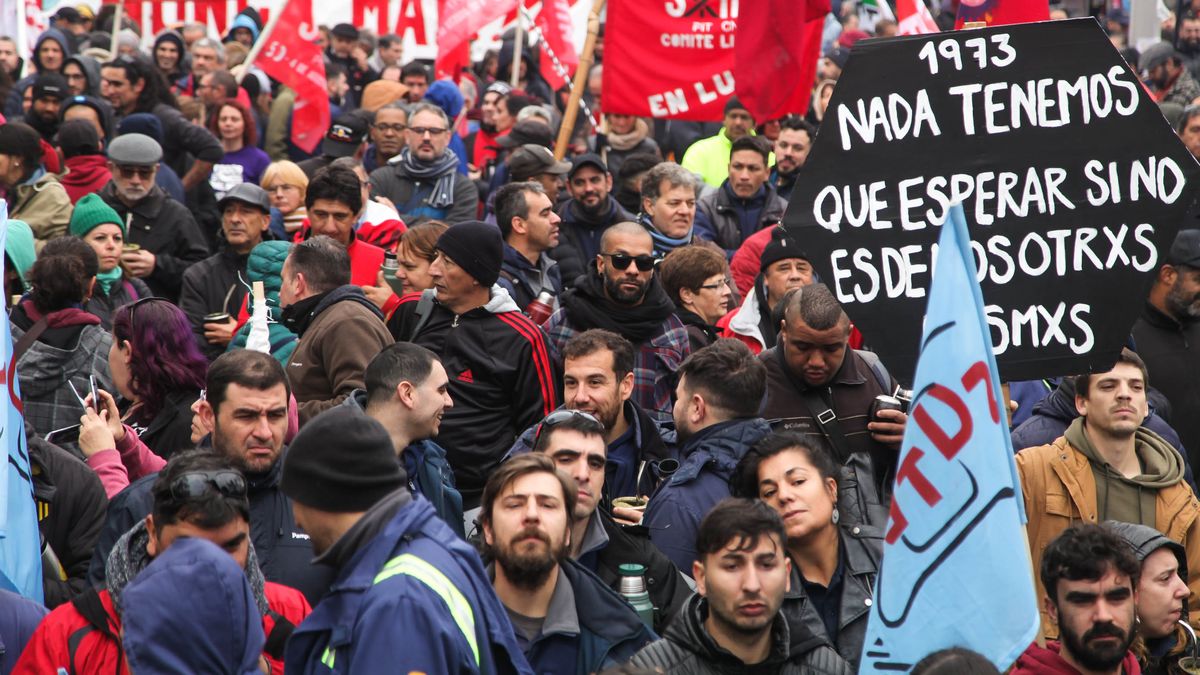This last year of the government of Luis Lacalle Pou has been crossed by great discontent and union pressure in sectors related to fuel, medical licenses of public officials, management of infrastructure Antel, as well as the constitutional plebiscite for pension reform.
COFE’s international complaint
The last COFE strike happened at the beginning of this month against the application of the new medical leave regime. From the outset, the union has called the new medical leave regime implemented in April this year “illegal, unconstitutional and absolutely unfair.” Previously, the union even filed a complaint with the International Labour Organization (ILO) a complaint against the new law.
For his part, the general secretary of COFE, Joselo Lopez, He criticised the fact that the collective bargaining stages with the union were not complied with. “Far from correcting a situation, which was what the government proposed to bring the private sector into line with the public sector, it creates more inequalities,” he lamented.
Meanwhile, they also claim that the old regime still holds political power. “The political system clearly does not have the same regime as the rest of the public officials,” the leader commented.
Regarding the complaint made two months ago, the director of the National Civil Service Office, Ariel Sanchezreported that the negotiation sessions will take place in the country.
These will be given through the mediation of the organization of the United Nations, authorized to interfere in the conflict to seek a conciliation between the parties following the presentation made by the union last Monday, in Geneva, Switzerland; within the framework of its 112th Conference.
The latest measures from Sutel
Last Friday, Sutel filed an appeal for revocation and annulment to avoid the resolution that authorizes the marketing of fixed connectivity services to private companies that will compete with Antel, a decision of the state-owned company in conjunction with the Executive Branch.
In the middle of this month, the Antel Directory approved the new business plan to sell fiber optic infrastructure services to large customers; that is, allow other companies to use the fiber optics of Antel to offer their own fixed internet servicesIn exchange, the public company will charge a wholesale rate that enables the use of two sections of the network, connectivity and international access, while the last section must be completed by the cable operators.
“The extended Representative Table of the PIT-CNT supported all the actions that Sutel decides to carry out against the privatization and dispossession that, according to them, is intended to be carried out to the detriment of the heritage of Antel and of Uruguay”, the union announced on its official website.
Coincidentally, the general secretary of Sutel, Florence Leymonieexplained that the union’s intention is for the Board to re-evaluate the decision. “We request that it be suspensive effectbut that is a decision that corresponds to Antel”, He added: “At the same time, we are asking for information, because the decision was not actually made public. We are basing ourselves on what has been published in the headlines and on the statements of one of Antel’s directors, who has stated that this is a ‘terrible’ decision for the public company.”
“This is also part of the defense of Antel, not only in political terms as a union, but in what is inherent to our status as public officials. According to the statute of public officials, we have the responsibility to defend the company. For this reason, we also filed the appeal based on the merits, opportunity and convenience of the resolution,” he concluded.
Fancap remains in conflict
Last week Fancap carried out a series of forceful measures in several of Ancap’s refineries in relation to the lack of response from the state company to the claim for the delivery to private companies of the aerofuel plant from Carrasco.
Weeks ago, Fancap expressed its rejection of the agreement reached by the state firm for its exit from Talobras, a public limited company created in 2012 with capital of Ancap, Petrobras Uruguay (acquired in 2020 by DISA) and Golden Sails (today Orodone SA).
“Ancap is delivering to private a completely refurbished, new plant, which has investments “very important projects that have been carried out in recent years in terms of infrastructure, tanks and so on, practically at zero cost to a private company,” Colina questioned.
On the fate of the fuel sales business In Carrasco, he said: “Now DISA would be keeping it and, with the excuse of avoiding a possible trial, the Uruguayan people, who owns all these assets, is paying a private company with them to use them.”
For the union leader, this is a “bad decision” and he ratified the measures “surprisingly” for this Friday, although he anticipated that they will probably be extended for a “short time.”
The PIT-CNT campaign has begun
Added to these union conflicts is the initiative of the plebiscite on social security. PIT-CNT, a proposal that has the government on edge and has been rejected by several economists. The campaign seeking votes in favour in the presidential elections in October began last week.
The activity was a “day of agitation” that included the deployment of hundreds of tables throughout the country, where activists will present the arguments behind the constitutional reform promoted by the union, summarized under the slogan “vote for a better retirement.”
“It was clear that the campaign had begun,” said the president of the PIT-CNT, Marcelo Abdala, at a training workshop held last week, referring to the ruling party’s decision to coordinate its actions to oppose the proposed reform and thus defend the changes implemented by the current government to the pension system.
In this sense, Abdala defined them as the “Holy Alliance” of detractors to the possibility that “the people say ‘Yes’ to the precautionary measures” provided for by the popular consultation, achieved through the more than 400,000 signatures collected for its authorization by the Electoral Court.
Source: Ambito




